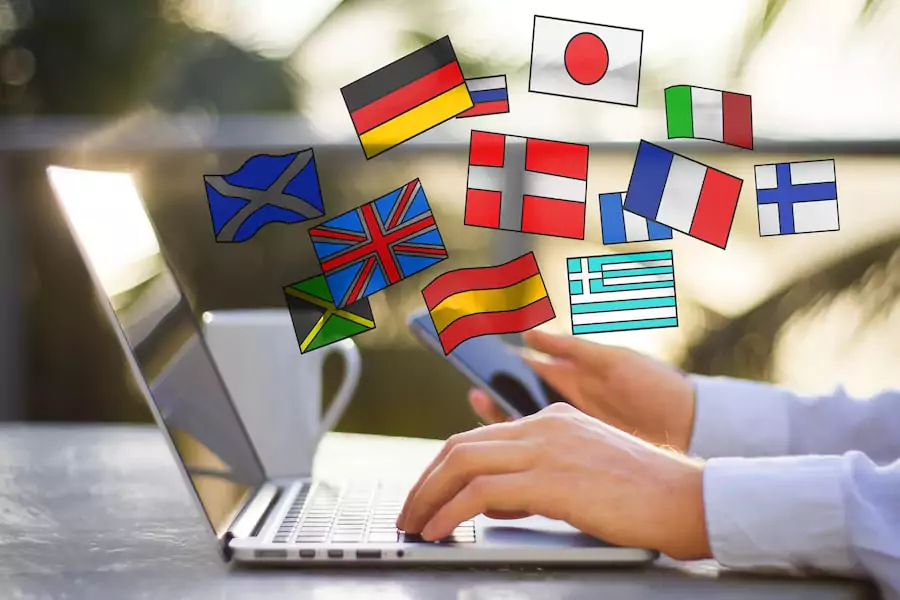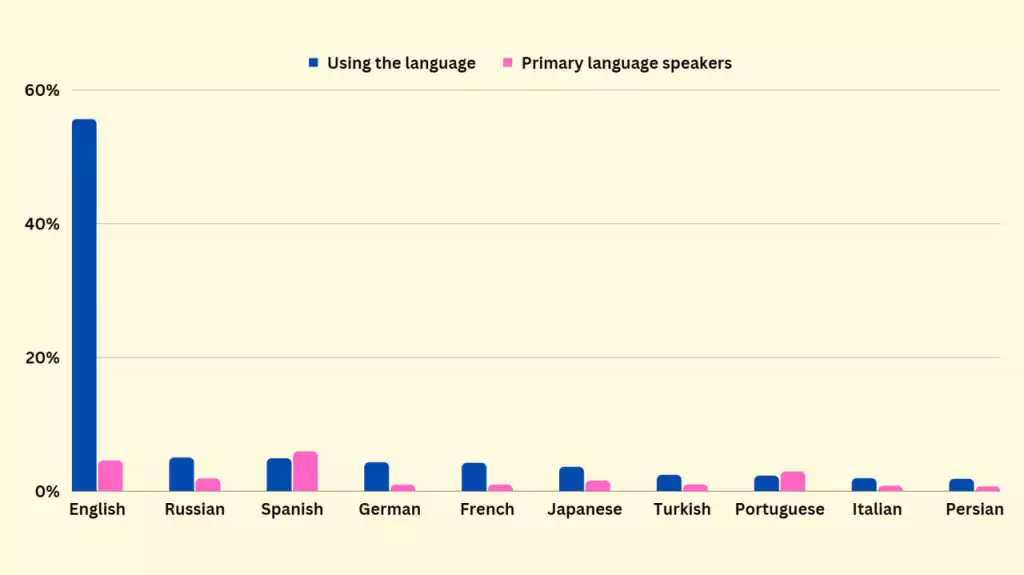
The widespread reach of the internet has connected over 5 billion people globally. However, there is a growing disparity in the linguistic representation online. While numerous languages exist in the world, few of them are dominantly present on the web, creating an imbalance that questions the universality of internet access.

✅ AI Essay Writer ✅ AI Detector ✅ Plagchecker ✅ Paraphraser
✅ Summarizer ✅ Citation Generator
Key Takeaways:
- English, spoken by less than 5% of the world population, is the primary language on over 50% of websites.
- Despite being among the most widely spoken languages, Chinese and Hindi have a surprisingly low presence online.
- The disparity between languages spoken and those used online could influence future AI technology.
Unveiling the Language Disparity in Cyberspace
A recent examination of the world wide web conducted by W3Techs, an Austrian web-scanning firm, revealed an astonishing linguistic imbalance. The data shows that English, used by under 5% of the global population, is the primary language for more than half of all websites. This discrepancy becomes more evident when compared to languages like Chinese and Hindi, the second and third most spoken languages globally. They account for just 1.4% and 0.07% of domains, respectively.
This imbalance is stark for languages like Bengali and Urdu, spoken by hundreds of millions of people but scarcely found online. The gap between spoken languages and their representation online is concerning, as Bhanu Neupane, a program manager at UNESCO who works with language inequity, warns that “The world is converging,” and “after 15 years, there could be just five or 10 languages that are prominently spoken and used in business and online.”
In the following table, we summarize the linguistic disparity observed in digital domains:

Spanish vs. Chinese: Which Language Will Emerge as the Next Internet Leader?
Both Spanish and Chinese hold significant influence in the world, considering their vast number of native speakers. However, when it comes to the digital world, the situation paints a different picture. Spanish, spoken by approximately 460 million people, has a robust online presence that reflects the language’s global spread across numerous countries and cultures.
On the other hand, Chinese, despite being the primary language for approximately 1.3 billion people, finds itself remarkably underrepresented in the digital landscape, accounting for just 1.4% of all domains. This disparity begs the question – why is there such a mismatch between the number of speakers and their online representation?
A deep dive into the factors contributing to this disparity reveals a complex interplay of socio-political dynamics and technological infrastructure. The Chinese government’s stringent internet regulations, coupled with the self-contained nature of many Chinese internet services, contributes significantly to the language’s limited presence on the global web. In contrast, Spanish’s extensive reach online can be attributed to a high degree of internet freedom in Spanish-speaking countries and widespread bilingualism with English.
The question of which language might emerge as the next internet leader largely depends on how these factors evolve over time. Will the expanding digital infrastructure in Spanish-speaking countries and the trend of bilingualism continue to fuel the growth of Spanish online? Or will changes in internet policy and tech advancements in China propel the Chinese language to have a more substantial digital footprint? Only time will tell.
| Language | Global Speakers | Internet Presence | Influencing Factors |
|---|---|---|---|
| Chinese | ~1.3 billion | 1.4% | Government regulation, self-contained internet services |
| Spanish | ~460 million | ~5% | Internet freedom, bilingualism |
The Future Implications of Language Disparity
The linguistic imbalance in the digital realm does not merely limit the range of information accessible to different language speakers. It carries profound implications for the future, particularly in the context of artificial intelligence.
AI language models, such as GPT-4 and Bard, rely heavily on publicly available text online for training. Given the dominance of English in the online sphere, these models may inadvertently propagate this linguistic bias, developing a stronger understanding and generating content more accurately in English than in other languages.
This means that non-English speakers could potentially have a less nuanced and effective interaction with these AI technologies. It might even result in the exclusion of certain communities from harnessing the full potential of AI if the linguistic bias is not addressed.
Moreover, these imbalances could feed into a vicious cycle. The AI technologies trained on biased data may further enhance the digital dominance of certain languages, making it harder for other languages to break through the barrier.
Such a trend, if unchecked, could have far-reaching implications. It could lead to a scenario where the digital world is predominantly confined to a few languages, limiting the richness and diversity of linguistic representation. It also raises ethical questions about equitable access to digital resources and the perpetuation of cultural hegemony through technology.
Therefore, while the internet has been a globalizing force, we must remain mindful of these disparities and work towards a digital landscape that is representative of our diverse linguistic heritage. It calls for concerted efforts from policymakers, tech companies, and communities to ensure digital inclusivity.
The Final Words
The existing linguistic disparity online highlights the need for efforts to maintain online content in a wide range of languages. It’s essential to ensure that the internet remains a global communication tool, rather than converging to a few dominant languages.
Read more:
From ‘Achievement Gap’ to ‘Education Debt’: How Language in Education Matters
Can Duolingo Get You to B2? Language Learners Weigh In
Navigating the Language Learning Journey: Experiences and Strategies with Duolingo
Follow us on Reddit for more insights and updates.





Comments (0)
Welcome to A*Help comments!
We’re all about debate and discussion at A*Help.
We value the diverse opinions of users, so you may find points of view that you don’t agree with. And that’s cool. However, there are certain things we’re not OK with: attempts to manipulate our data in any way, for example, or the posting of discriminative, offensive, hateful, or disparaging material.